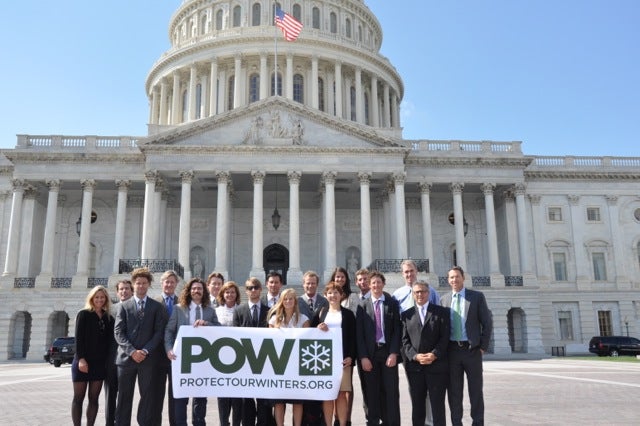Alaska Senator Lisa Murkowski wants to see more oil and gas drilling on public lands—and that includes opening up the Arctic National Wildlife Refuge (ANWR) for exploration. She opposes levying new regulations on coal mining and power plants in order to curb carbon emissions. But she also loves to ski.
Turns out, her nephew is part of the crew that makes those arty ski movies. That’s the kind of thing you’d have to sit in Murkowski’s D.C office, along with a gaggle of the world’s best skiers, snowboarders and snowsports industry executives, to find out. That’s how Chris Steinkamp, executive director of , and Auden Schendler, vice president of sustainability at Aspen Skiing Company, learned about that odd 6 degrees of separation. It’s also the kind of common ground that might help them get their message across to the Congressional leaders. That message is this: We represent an important part of the U.S. economy and we support President Obama’s plan to use the Clean Air Act as a vehicle for curbing carbon emissions from power plants.
Tuesday was not the first time that Steinkamp and Schendler have traveled to Washington, D.C., to lobby for policies that address climate change. They’ve been joined by athletes in past years, as well, such as Gretchen Bleiler and Jeremy Jones. But this time it was different: a powerful posse of nearly 20 ski and snowboard luminaries.
“We had two-time gold medalist snowboarder Seth Wescott, we had Chris Davenport, we had Forest Shearer, we had Danny Davis, we had legendary mountaineer Conrad Anker. And then, aside from all these athletes, we had executives from Black Diamond, from Patagonia, K2. Donna Carpenter, who founded Burton, the largest snowboard company in the world. It was a remarkable group,” said Schendler. David Ingemie, president of Snowsports Industries America, came along for the meet-and-greets, too.
On Monday night, with the government shut-down looming, Steinkamp was afraid the trip might be a bust. But by Tuesday evening, as they walked to a D.C. restaurant for dinner, it was clear that Steinkamp and Schendler were proud and pleased with the “wall-to-wall” meetings they had crammed into the day and by how their all-star group of cohorts had bolstered their call for climate protections.
Combined, the individuals and companies represented in the group reach 6 million people through social media, said Schendler. “I looked around the table, I saw these legendary athletes, and I realized what our mission is, which is that we’re going to use the power of this group to create the policies we need to fix climate. It was a real epiphany.” Indeed, by Tuesday afternoon, these folks’ , Facebook and Instagram pages were all abuzz with quips and pics about their trip to Washington.
However, the government shutdown did mean that representatives from the Environmental Protection Agency and the White House Council on Environmental Quality were unavailable, and these were key meetings for the group.
Beat Down, Open and Honest
Aside from Murkowski, the snowsports crew met with “the full gamut” of Congressmen and women from all along the political spectrum, said Steinkamp, who added his opinion that the drama of the preceding days, as the House and Senate played chicken over Obamacare, had left some of the Senators and Representatives “beaten down and open and honest with us, which was refreshing.”
The day’s agenda included stops in the offices of “extreme allies” like Mike Bennett from Colorado, said Schendler. The group also met with Democratic Senators John Tester and Max Baucus from Montana, who Steinkamp said were open and supportive, despite having to serve constituencies that have strongly differing interests when it comes to climate and policy.
While Murkowski said she disagreed with the group’s support of increasing government regulation over energy companies, Steinkamp is taking the long view. “We met with her two years ago and [she made] no admission of climate change. Now, she admits that climate change is real, but says how we’re approaching it is not how she would approach it.”
Baby steps? Perhaps, but the clock is ticking. The United Nations’ Intergovernmental Panel on Climate Change (IPCC) report released last week said there is better than 95 percent chance that we are the cause of climate change, and that the climate will continue warming for centuries. To be exact, the report says, “A large fraction of anthropogenic climate change resulting from CO2 emissions is irreversible on a multi-century to millennial time scale, except in the case of a large net removal of CO2 from the atmosphere over a sustained period.”
The rather nascent state of carbon sequestration technologies leaves the snowsports industry little choice but to push for major changes in the national carbon diet. While the kind of “operational greening” that many ski resorts are doing on a case-by-case basis is important, Steinkamp said the call for tough climate policies is far more crucial.
Protect Our Winters has been critical in the past about what it saw as the National Ski Area Association’s lack of political activism to fight climate change. I asked NSAA’s director of public policy, Geraldine Link, how the NSAA is reacting to the latest IPCC report and she said it “confirms for ski areas that we are on the right track when it comes to climate change action and advocacy.” She also listed some of the green building and energy efficiency projects the association supports and noted that NSAA’s advocacy of climate change legislation dates back to 2002.
Whether the ski industry is doing enough to speak out for Obama’s Climate Plan appears to be up for debate. But Steinkamp has seen a definite shift among the willingness of top skiers and snowboarders to speak up – even if that means traveling to Washington, D.C. to do it. “Four years ago, [some of these athletes] might have said they’re not entirely sure, but I think people are really taking climate change seriously now,” said Steinkamp.
“I asked Forest Shearer, ‘why are you here?'” said Schender. “He said, ‘it’s my duty.’ There was a broad sense of that among this group today. They felt this obligation.”


